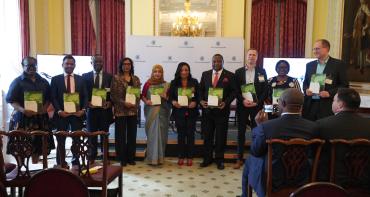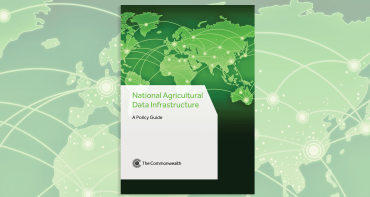Deputy Secretary-General Josephine Ojiambo delivered compelling insights into the Commonwealth’s work on e-commerce to business leaders, policy makers and students at the International Chamber of Commerce’s (ICC) Global Debate, entitled Moving Forward on Digital Trade.

Deputy Secretary-General Josephine Ojiambo delivered compelling insights into the Commonwealth’s work on e-commerce to business leaders, policy makers and students at the International Chamber of Commerce’s (ICC) Global Debate, entitled Moving Forward on Digital Trade.
Rounding off a lively evening of debate and questions at JP Morgans' office in London’s Docklands last night, Dr Ojiambo highlighted the Commonwealth’s support for innovation research and technical assistance on trade competitiveness.
She said: “Our support includes the creation of policy handbooks on e-commerce, as well as technical assistance to member states. In fact, right now the Secretariat is assisting members through our Geneva-based Small States office as they prepare for the forthcoming discussions at the next WTO Ministerial Meeting in Buenos Aires.
She added: “Within the Commonwealth family, we know there are areas of mutual interest, where enhanced co-ordination between Commonwealth members could greater enhance trade gains.”
Earlier, the UK’s Minister of State for International Development, Lord Bates, and Costa Rica’s Minister of Foreign Trade, Alexander Mora, delivered keynote speeches. They were followed by a lively panel debate between Nick Hart, consultant in international digital trade; Nora Senior, chair and head of EMEA Energy, Weber Shandwick; Joakim Reiter, Group External Affairs Director, Vodafone, and Annie Renison, head of trade policy, Institute of Directors.
Making reference to the UN’s new Least Developed Countries report - launched in the UK at the Commonwealth just yesterday - Dr Ojiambo added: “We mustn’t forget what underpins digitisation in the first place, namely access to electricity. Indeed, the report finds that around 62 per cent of all people living in the world’s poorest countries, some 577 million people, do not even have access to electricity. And, for those living in rural areas in the world’s poorest countries, this figure rises to 82 per cent.”
Dr Ojiambo ended her speech by stating that the Secretariat welcomes the opportunity to work with the ICC on these issues in the future.


